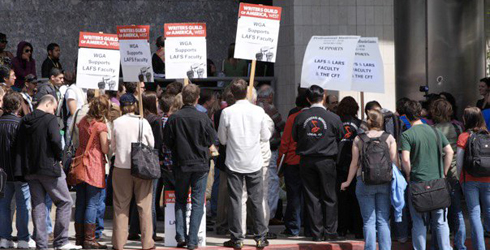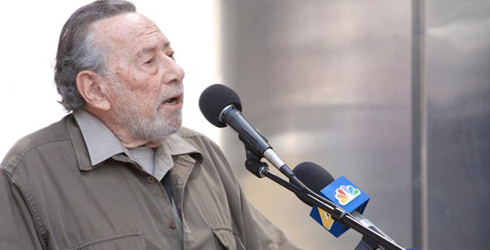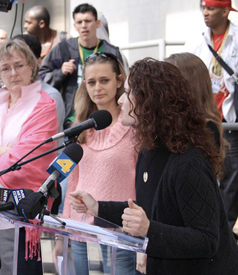Concerns over faculty pay, benefits and students’ classes have propelled a union organizing drive at the private Los Angeles Film School, where management is not pleased that a majority of staff want to join the California Federation of Teachers (CFT), AFL-CIO.
Some faculty members contacted the CFT on February 1, said Tema L. Staig, who teaches at the Los Angeles Film School. A few days later, about 65 percent of the 125-member faculty signed cards to authorize CFT representation, according to Peter Nguyen of the CFT.
Next, the CFT submitted the signed authorization cards to the National Labor Relations Board (NLRB), the federal agency that oversees union election campaigns. Recently, the CFT finished four days of hearings with the NLRB to determine the parameters of the new proposed collective bargaining unit, Nguyen said.
Allegedly, Los Angeles Film School, management fired one instructor, Brandii Grace, and disciplined another, Celina Reising, for being involved in the union campaign to win collective bargaining representation with the CFT. Management fired Grace one week after promoting from course director of computer game design to chair of the department at the Los Angeles Film School, according to Nguyen and Staig.
The Los Angeles Film School denies the allegations, said Antoine Ibrahim, school spokesman.
Grace and Reising have pending unfair labor practice hearings with the NLRB. Unions that do file ULP documents face a lengthy process in fighting employers’ anti-union tactics, according to top labor scholar Kate Bronfenbrenner of Cornell University.

Meanwhile, Los Angeles Film School management is holding mandatory union education meetings with the faculty, Nguyen, Reising and Staig said.
“The captive-audience meetings are so insulting,” said Staig. “They really have this divide-and-conquer mentality.”
The Los Angeles Film School has hired a variety of companies to lead these meetings with employees on different labor-management issues, said Ibrahim. Asked for the names of the firms involved, he declined to provide them at their request.
IRI Consultants, based in Detroit, Michigan, is one of the firms, said a faculty member at the Los Angeles Film School, who declined to be named. At its web site, IRI Consultants warns employers of the urgency to fight the passage of the Employee Free Choice Act (EFCA), which would “give unions a much faster, more effective, less expensive way to add members.”
The EFCA amends the National Labor Relations Act of 1935. Currently, the EFCA lacks enough Congressional votes for President Barack Obama to sign it into law.

Diana Derycz-Kessler is the CEO and president of the Los Angeles Film School. “With respect to the California Federation of Teachers, we are doing our best to educate our faculty in regards to their options,” she said in an email statement. “Our hope is to continue having open and direct communication with our faculty.”
“Under the free speech provisions of the NLRA, employers have control of the communication process,” according to Bronfenbrenner. Further, federal labor law bars unions’ access to employees at their workplace.
The NLRB must resolve several questions before setting a date for a union election, according to Nguyen of the CFT, which represents 120,000 teachers and support personnel.
Los Angeles Film School management has retained a law firm that has filed briefs, according to Staig, to delay the union election.

“It’s just another stall tactic,” she said. “We want a vote without intimidation. Nobody should feel afraid to do something that is very American, to vote without being fired or insulted.”
Local labor unions rallied to support the Los Angeles Film School organizing campaign on March 24. At a press conference that day, supporters from Actors Equity to the Directors Guild of America and the American Federation of Musicians turned out to back the pro-union faculty.
The “next logical step” in building support for the workers’ struggle to form a union at the Los Angeles Film School is reaching out to the Los Angeles City Council, Los Angeles County Board of Supervisors or the California Legislature, said Nguyen of CFT.
In the meantime, the Los Angeles Film School faculty remain at-will employees. Crucially, they have employment contracts, but their legal status is such that management can release them at any time.
Media that fights fascism
Truthout is funded almost entirely by readers — that’s why we can speak truth to power and cut against the mainstream narrative. But independent journalists at Truthout face mounting political repression under Trump.
We rely on your support to survive McCarthyist censorship. Please make a tax-deductible one-time or monthly donation.
